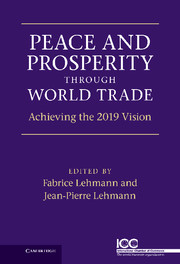Book contents
- Frontmatter
- Contents
- Notes on contributors
- Foreword
- Preface: the ICC vision
- Historical overview and dynamics
- Editorial note
- A Global systemic transformations
- Editorial introduction
- A1 Trade in the new Asian hemisphere
- A2 US allegiance to the multilateral trading system: from ambivalence to shared leadership
- A3 Trade for development: the case of China
- A4 Trade in the USA–China relationship
- A5 Unravelling India and strengthening external engagement for sustainable growth
- A6 Japan's contribution to an open trading system
- A7 Rebalancing Korean trade policy: from bilateral to multilateral free trade
- A8 Vietnam: a rising Asian tiger?
- A9 The European compact on trade still stands
- A10 Synergies with the Russian Federation
- A11 Reasons for an optimistic future view of trade and Latin America
- A12 Is the Brazilian giant finally awakening?
- A13 The Arab region and the GCC in tomorrow's trade
- A14 Growing African trade amid global economic turmoil
- B Governance of global trade
- C Poverty and global inequities
- D The long view on interlocking crises
- E Global business responsibilities
- Conclusion: the imperative of inclusive global growth
- Index
A10 - Synergies with the Russian Federation
Published online by Cambridge University Press: 05 July 2011
- Frontmatter
- Contents
- Notes on contributors
- Foreword
- Preface: the ICC vision
- Historical overview and dynamics
- Editorial note
- A Global systemic transformations
- Editorial introduction
- A1 Trade in the new Asian hemisphere
- A2 US allegiance to the multilateral trading system: from ambivalence to shared leadership
- A3 Trade for development: the case of China
- A4 Trade in the USA–China relationship
- A5 Unravelling India and strengthening external engagement for sustainable growth
- A6 Japan's contribution to an open trading system
- A7 Rebalancing Korean trade policy: from bilateral to multilateral free trade
- A8 Vietnam: a rising Asian tiger?
- A9 The European compact on trade still stands
- A10 Synergies with the Russian Federation
- A11 Reasons for an optimistic future view of trade and Latin America
- A12 Is the Brazilian giant finally awakening?
- A13 The Arab region and the GCC in tomorrow's trade
- A14 Growing African trade amid global economic turmoil
- B Governance of global trade
- C Poverty and global inequities
- D The long view on interlocking crises
- E Global business responsibilities
- Conclusion: the imperative of inclusive global growth
- Index
Summary
The Russian trajectory of the past twenty years has been a mercurial blend of the extraordinary and the dreary. It has carried little synchronicity with the triumphalist political and intellectual hubris in Western quarters which greeted the disintegration of the Soviet Union.
Few had foreseen the speed with which the policies introduced by a reformist General Secretary would unravel the contradictions of Soviet developmentalism and snowball into outright collapse. Yet the vocal foreign experts and principal architects of post-Soviet Russian economic policy deceived themselves into believing that the core of a disintegrating Empire – comprising a military-industrial rustbelt, a demoralized workforce, a dispersed population, a rising wave of nationalist and ethnic sentiment, serious environmental damage, collapsing state structures and a lingering concern over territorial integrity – would morph into a democratically sanctioned liberal market economy.
The immediate demonstration of this euphoric lack of humility was the reckless imposition of an economic model based on radical liberalization and privatization whose defining virtues were velocity and conceptual intransigence – a form of therapy no Western society had been subject to. The culminating point at the time of writing is a Russian development model characterized by highly unequal standards of living and a strong statist form of corporatism articulated along opaque verticals of power referred to as sovereign democracy.
Without drawing hasty conclusions on causality, it has been argued by Russian social analysts that the country has, since the late 1980s, been in a state of almost perpetual crisis – the latest cycle being the sharp swing in household fortunes from energy and credit-fuelled consumption to contraction associated with the 2008–2009 global economic downturn – and it is in this context that Russia's involvement in the global polity should be understood.
- Type
- Chapter
- Information
- Peace and Prosperity through World TradeAchieving the 2019 Vision, pp. 45 - 50Publisher: Cambridge University PressPrint publication year: 2010

